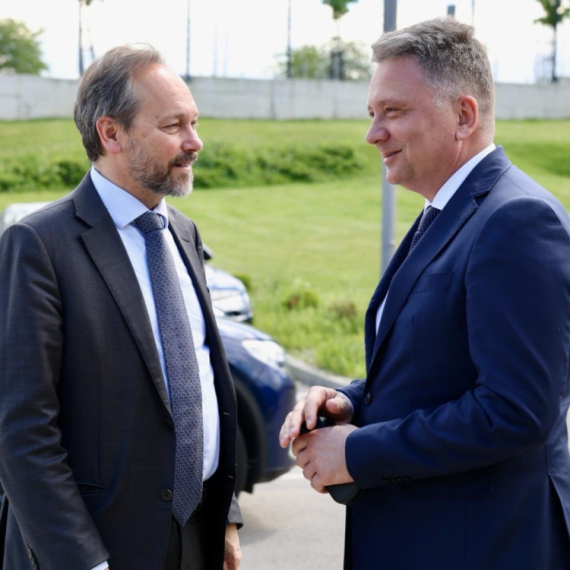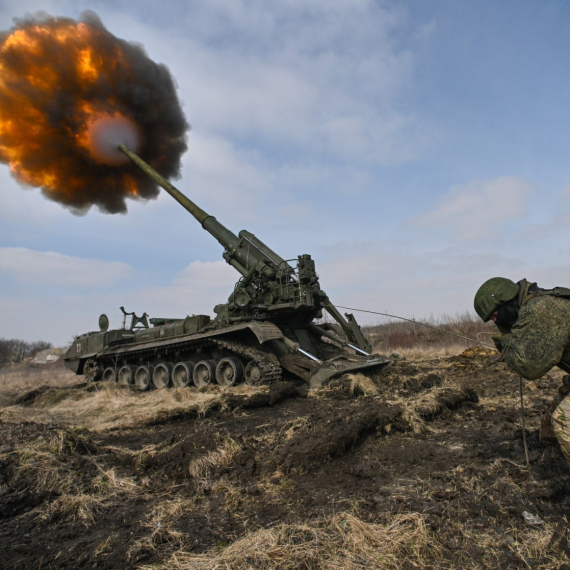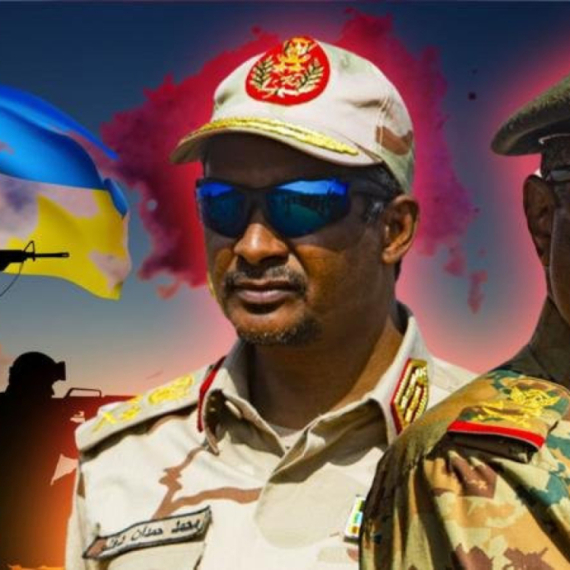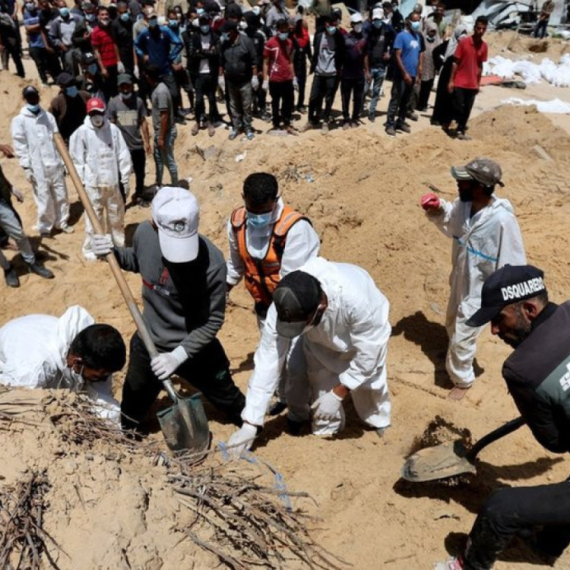Germany criticizes EU mission in Kosovo
NATO Secretary General Anders Fogh Rasmussen has stated that KFOR could get reinforcement in northern Kosovo.
Thursday, 11.10.2012.
17:12

BRUSSELS NATO Secretary General Anders Fogh Rasmussen has stated that KFOR could get reinforcement in northern Kosovo. NATO has strongly criticized EULEX and Germany has requested a complete change of the staff, organization and mandate of the EU mission in Kosovo. Germany criticizes EU mission in Kosovo The EU responded by saying that “the Mission’s fundamental reorganization has been recently completed with an aim to strengthen its functionality and efficiency”. EU member states that are also NATO members were involved in the reorganization process, including Germany, sources from Brussels said and underlined that a solution for northern Kosovo needed to be found “through a political process which is the EU’s priority, regardless of whether EULEX or NATO is in northern Kosovo”. EU High Representative for Foreign Affairs and Security Policy Catherine Ashton’s Spokeswoman Maja Kocijancic told Beta news agency on Thursday that “a political solution is necessary” and that “it can only be found through dialogue”. Beta was told by the well-informed sources from Brussels that the EU was surprised by such a strong criticism, especially by German Defense Minister Thomas de Maiziere at the NATO meeting on Wednesday. De Maiziere said that “Germany is not satisfied with the situation” and that “it simply cannot go on like this”. “We need a new beginning, new people, new structure and a new mandate. We have to resolve this within the EU,” he underscored. Some NATO members especially believe that EULEX police are not capable of performing their duties, such as to maintain public peace and order, especially in the north, so KFOR troops are forced to do it for them. This especially happens in situations when many countries that have their troops in KFOR would like to reduce the number of their soldiers in Kosovo as soon as possible, a high diplomat told reporters at the NATO headquarters. According to the well-informed sources, Germany, that has the biggest number of troops in Kosovo and the second KFOR commander, and the U.S. would like to find some comprehensive solution for the status of Kosovo as soon as possible so Serbia would accept some sort of independence of the Pristina government. Kocijancic said that the “EU welcomes every constructive criticism of the EU Mission in Kosovo” but underscored that “all EU member states approved a new two-year mandate of EULEX in June”. According to her, the new mandate includes “new organization, more active involvement in the field of judiciary and stronger presence of a new special police unit in northern Kosovo”. Kocijancic noted that “the current situation in northern Kosovo is still tense and it is possible that it could deteriorate and KFOR’s presence there is therefore very important and highly appreciated”. “We have a good cooperation with NATO forces in the field,” she added. However, Kocijancic said that the “security situation sometimes deteriorates quickly and we have witnessed that it often escalates into something that demands more than just police presence and law enforcement bodies”. “And there have been bomb and firearm attacks in situations like that,” Ashton’s spokeswoman added. Certain officials wanted to point to the fact that the “EULEX police simply cannot perform some tasks that require NATO troops because when bombs are exploding or live ammunition is used, KFOR needs to respond with military force”. NATO has 6,148 soldiers in Kosovo. Defense ministers of NATO member states repeated at the Wednesday meeting that NATO aimed at “smaller but more adjusted military presence in Kosovo once circumstances and time allow it”. However, they did not announce any reduction in the number of troops for now. NATO’s goal is to reduce the number of KFOR troops by half, to be tasked only with “threat deterrence” and to give a higher level of authority to the Pristina security services. Beta
Germany criticizes EU mission in Kosovo
The EU responded by saying that “the Mission’s fundamental reorganization has been recently completed with an aim to strengthen its functionality and efficiency”.EU member states that are also NATO members were involved in the reorganization process, including Germany, sources from Brussels said and underlined that a solution for northern Kosovo needed to be found “through a political process which is the EU’s priority, regardless of whether EULEX or NATO is in northern Kosovo”.
EU High Representative for Foreign Affairs and Security Policy Catherine Ashton’s Spokeswoman Maja Kocijančić told Beta news agency on Thursday that “a political solution is necessary” and that “it can only be found through dialogue”.
Beta was told by the well-informed sources from Brussels that the EU was surprised by such a strong criticism, especially by German Defense Minister Thomas de Maiziere at the NATO meeting on Wednesday. De Maiziere said that “Germany is not satisfied with the situation” and that “it simply cannot go on like this”.
“We need a new beginning, new people, new structure and a new mandate. We have to resolve this within the EU,” he underscored.
Some NATO members especially believe that EULEX police are not capable of performing their duties, such as to maintain public peace and order, especially in the north, so KFOR troops are forced to do it for them.
This especially happens in situations when many countries that have their troops in KFOR would like to reduce the number of their soldiers in Kosovo as soon as possible, a high diplomat told reporters at the NATO headquarters.
According to the well-informed sources, Germany, that has the biggest number of troops in Kosovo and the second KFOR commander, and the U.S. would like to find some comprehensive solution for the status of Kosovo as soon as possible so Serbia would accept some sort of independence of the Priština government.
Kocijančić said that the “EU welcomes every constructive criticism of the EU Mission in Kosovo” but underscored that “all EU member states approved a new two-year mandate of EULEX in June”.
According to her, the new mandate includes “new organization, more active involvement in the field of judiciary and stronger presence of a new special police unit in northern Kosovo”.
Kocijančić noted that “the current situation in northern Kosovo is still tense and it is possible that it could deteriorate and KFOR’s presence there is therefore very important and highly appreciated”.
“We have a good cooperation with NATO forces in the field,” she added.
However, Kocijančić said that the “security situation sometimes deteriorates quickly and we have witnessed that it often escalates into something that demands more than just police presence and law enforcement bodies”.
“And there have been bomb and firearm attacks in situations like that,” Ashton’s spokeswoman added.
Certain officials wanted to point to the fact that the “EULEX police simply cannot perform some tasks that require NATO troops because when bombs are exploding or live ammunition is used, KFOR needs to respond with military force”.
NATO has 6,148 soldiers in Kosovo. Defense ministers of NATO member states repeated at the Wednesday meeting that NATO aimed at “smaller but more adjusted military presence in Kosovo once circumstances and time allow it”. However, they did not announce any reduction in the number of troops for now.
NATO’s goal is to reduce the number of KFOR troops by half, to be tasked only with “threat deterrence” and to give a higher level of authority to the Priština security services.































Komentari 5
Pogledaj komentare